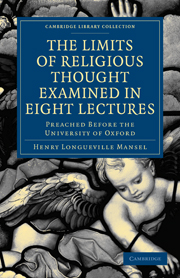 The Limits of Religious Thought Examined in Eight Lectures
The Limits of Religious Thought Examined in Eight Lectures Book contents
Summary
“FOR AFTER THAT IN THE WISDOM OF GOD THE WORLD BY WISDOM KNEW NOT GOD, IT PLEASED GOD BY THE FOOLISHNESS OF PREACHING TO SAVE THEM THAT BELIEVE. FOR THE JEWS REQUIRE A SIGN, AND THE GREEKS SEEK AFTER WISDOM: BUT WE PREACH CHRIST CRUCIFIED, UNTO THE JEWS A STUMBLING-BLOCK, AND UNTO THE GREEKS FOOLISHNESS; BUT UNTO THEM WHICH ARE CALLED, BOTH JEWS AND GREEKS, CHRIST THE POWER OF GOD, AND THE WISDOM OF GOD.”
“Though it were admitted,” says Bishop Butler, “that this opinion of Necessity were speculatively true; yet, with regard to practice, it is as if it were false, so far as our experience reaches; that is, to the whole of our present life. For the constitution of the present world, and the condition in which we are actually placed, is as if we were free. And it may perhaps justly be concluded that, since the whole process of action, through every step of it, suspense, deliberation, inclining one way, determining, and at last doing as we determine, is as if we were free, therefore we are so. But the thing here insisted upon is, that, under the present natural government of the world, we find we are treated and dealt with as if we were free, prior to all consideration whether we are or not” (1).
That this observation has in any degree settled the speculative difficulties involved in the problem of Liberty and Necessity, will not be maintained by any one who is acquainted with the history of the controversy.
- Type
- Chapter
- Information
- The Limits of Religious Thought Examined in Eight LecturesPreached before the University of Oxford, in the Year M.DCCC.LVIII on the Foundation of the Late Rev. John Bampton, pp. 95 - 117Publisher: Cambridge University PressPrint publication year: 2009First published in: 1867
